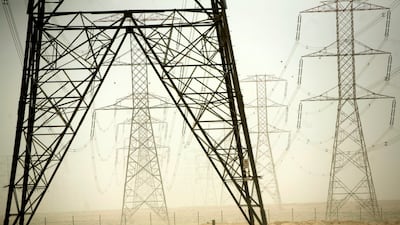Saudi Arabia's utility developer Acwa Power and its partner Gulf Investment Corporation have signed an agreement with Kuwait to develop two phases of Az-Zour North water and power plant with total investment of $4 billion.
The agreement, signed on Sunday with the Kuwait Authority for Partnership Projects (KAPP), is intended to help the country address severe electricity shortages.
The phases two and three of the Az-Zour North project will have a net power generating capacity of at least 2.7 gigawatts and a desalination capacity of 120 million gallons of water daily, Acwa Power and GIC said in a statement on Sunday.
Under a 25-year agreement, the Acwa Power-led consortium will design, finance, build, operate, maintain and transfer the plant and its associated facilities.
“This investment highlights our commitment to Kuwait’s growth vision,” Raad Al-Saady, managing director and vice chairman of Acwa Power, said.
Electricity shortages
The deal is in line with Kuwait's push to boost its electricity generating capacity and further build its water infrastructure.
Kuwait, in the recent past, had to implement temporary power cuts in select industrial and agricultural areas as demand surged beyond the available capacity.
This is not the first time Kuwait has grappled with electricity supply issues. Last summer, it resorted to rare scheduled power cuts as temperatures soared.

Experts have long warned of an impending electricity crisis in Kuwait, citing indecision over the construction of power stations to meet rising demand. Additionally, much of the country's power infrastructure is outdated and requires frequent maintenance.
Another key challenge in addressing the crisis is Kuwait’s subsidy-driven energy model. The government provides heavily subsidised electricity to residents, leading to high consumption as customers have little financial incentive to reduce their consumption.
Kuwait has set a target of generating 15 per cent of its electricity from renewable sources by 2030.
Capital structure
The Acwa Power-led consortium and KAPP will establish a project company, where the consortium will hold 40 per cent and KAPP will retain 60 per cent of the company’s share capital, according to the statement.
KAPP will then allocate 50 per cent of the company’s capital for public subscription by Kuwaiti citizens after the project becomes fully operational by 2029 and is listed on the Kuwait Stock Exchange, the statement said.
Kuwait-based GIC is equally owned by the six member states in the Gulf Co-operation Council. It has developed and owns 10 infrastructure projects in the region and has vast experience in the power and water and utilities sector in the Gulf.
“GIC is committed to ensuring the provision of sustainable electricity and water resources at competitive economic costs to support Kuwait’s social and economic prosperity,” Ibrahim Al-Qadhi, chief executive of GIC, said.
Acwa Power, backed by Saudi Arabia's sovereign wealth fund, the Public Investment Fund, is one of the largest renewable energy developers in the Middle East. It currently has operations in 15 countries across the Middle East, Africa, and Central and South-east Asia.
It is an investor in and operator of 109 power generating and water desalination projects in operation, construction and advanced development with an overall portfolio size of about $117 billion.


